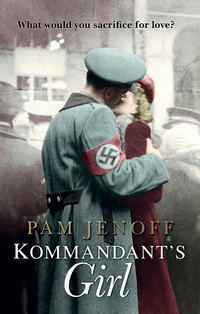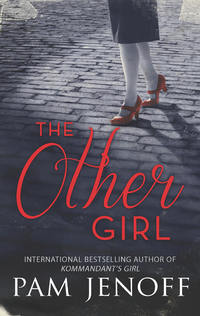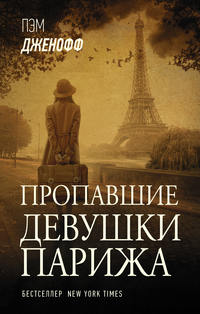
Полная версия
The Lost Girls Of Paris
“Why don’t we break for lunch?” Frankie asked when it was nearly one o’clock. Grace knew he really meant that she should take lunch, while he would keep working, at most eat whatever she brought back for him. But she didn’t argue. She hadn’t eaten either today, she recalled as she started down the stairs.
Ten minutes later, Grace stepped out onto the flat rooftop of the building where she liked to eat when the weather permitted. It had a panoramic view of Midtown Manhattan stretching east to the river. The city was beginning to resemble one big construction site, from the giant cranes building glass-and-steel skyscrapers across Midtown to the block apartments going up on the edge of the East Village. She watched a group of girls on their lunch hour step out of Zarin’s Fabrics, long-legged and fashionable, despite the years of shortages and rationing. A few even smoked now. Grace didn’t want to do that, but she wished she fit in just a bit. They seemed so sure of their place. Whereas she felt like a visitor whose visa was about to expire at any moment.
Grace wiped off a sooty windowsill and perched on it. She thought of the photos in her purse. A few times that morning, she’d wondered if she had imagined them. But when she’d gone into her purse to fish out some coins for lunch, there they sat, neatly wrapped in the lace. She had wanted to bring them with her and have another look over lunch, but the roof tended to be breezy and she didn’t want them to blow away.
Grace unwrapped the hot dog she’d bought from the vendor, missing the egg salad sandwich she usually packed. She liked a certain order to her world, took comfort in its mundaneness. Now the whole apple cart seemed toppled. With last night’s misadventure, she had moved just one piece out of place (admittedly a very big one, but a single piece nonetheless) and now it seemed that everything was in complete disarray.
Turning her gaze uptown, her eyes locked on the vicinity of a certain high rise on the East River. Though she couldn’t see it, the elegant hotel where she had spent the previous night loomed large in her mind. It had all started innocently enough. On her way home from work, Grace had stopped for dinner at Arnold’s, a place on Fifty-Third Street that she had passed dozens of times, because she didn’t have anything in the shared icebox in the boardinghouse kitchen. She had planned to ask for her meal to go, broiled chicken and a potato. But the mahogany bar, with its soft lighting and low music, beckoned. She didn’t want to sit in her cramped room and eat alone again.
“I’ll have a menu, please,” Grace said. The maître d’s eyes rose. Grace made her way to the bar trying to ignore the looks of the men, surprised to see a woman dining alone.
Then she noticed him, a man at the edge of the bar in a smart gray suit, facing away from her. He had broad shoulders and close-cut, curly brown hair tacked into place with pomade. A long-forgotten interest stirred in her. He turned and rose, his face lifting with recognition. “Grace?”
“Mark...” It had taken a second for her to place him so far out of context. Mark Dorff had been Tom’s college roommate at Yale.
More than Tom’s roommate, she realized as the memories returned. His best friend. Though two years older than Tom, Mark had been a constant presence among the sea of boys in navy wool blazers at events, and at the homecoming dances. He had even been an attendant in her wedding. But this was the first time they had really spoken, just the two of them.
“I didn’t realize that you were living in New York,” he remarked.
“I’m not. That is, sort of.” She fumbled for the right words. “I’m here for a time. And you?”
“I’m living in Washington. I was here for a few days for work, but I’m headed back first thing tomorrow. It’s good to see you, Gracie.” She had always disliked the nickname her family had given her, that Tom had picked up for his own. It felt diminutive, designed to keep her in her place. But now there was a kind of warmth to hearing it that she realized she had missed during her months alone in the city. “How are you?”
There it was, the question she dreaded most since Tom’s death. People always sounded as though they were trying to get the level of sympathy in their voices just right, to ask in a personal-but-not-too-personal way. Mark looked concerned, though, like he really meant it. “That’s such a stupid thing to ask,” he added when she did not answer. “I’m sorry.”
“It’s fine,” she said quickly. “I’m managing.” In truth, it had gotten easier. Being in New York and not seeing the places that would remind her of Tom every day allowed her to put it behind her, at least for a time. That numbness, that kind of forgetting, was part of what had driven her to New York. Yet she felt guilty for having found it.
“I’m sorry I couldn’t be at the funeral. I was still overseas.” He dipped his chin. His features were not perfect, she noticed then. Hazel eyes a bit too close together, chin sharp. But the way they fit together was handsome.
“It was all a blur,” she confessed. “But those flowers...” They had towered over the others. “It was so kind of you.”
“It was the least I could do. Losing Tom like that, it was just so goddamned wrong.” Grace could see from his face that the loss of his friend had affected him deeply. Mark had been different than the other boys at Yale, she recalled then, and not just because he was Tom’s best friend. A bit quieter, but in a confident rather than shy sort of way. “We’re going to put together a scholarship fund in his name.”
Grace felt a sudden urge to flee as the past seemed to well up all around her. “Well, it was lovely seeing you.”
“Wait,” he said, touching her arm. “Sit a minute. It would be nice to talk to someone who knew Tom.”
Grace didn’t think it would be nice at all. But she sat, allowing the bartender to pour a healthy snifter of brandy. At some point Mark moved his bar stool closer without seeming presumptuous or wrong. From there the rest of the night grew fuzzy around the edges and hours faded. Later she would realize how the restaurant was actually much more of a bar. What had she been thinking, going there? She was a widow of just under a year and had no business talking to strange men.
But Mark was not a stranger. He had known Tom, really known him, and she found herself lost in his stories. “So then I discovered Tom on the roof of the dormitory and he had no recollection of how he’d gotten there. But he was only worried about being late for class,” Mark finished the story, which was meant to be funny.
But instead, Grace’s eyes began to burn. “Oh!” She brought her hand to her mouth as the tears spilled over.
“I’m sorry,” he said quickly.
“It’s not your fault. It’s just that you and I are here to laugh about it...”
“And Tom isn’t.” Mark understood, in a way no one else had. He reached over to smooth a smear of lipstick from her cheek. His hand lingered.
Mark switched the subject to something else then, she recalled. Music or politics, or maybe both. Only later would she realize that he had said nothing about himself.
Forcing her gaze from the direction of the hotel, Grace pushed the images from her mind. It was all done now. She had slipped from the elegant hotel room while he slept and hailed a taxi. She would never see him again.
Instead, she let herself think of her husband, the memories she usually kept so steadfastly at bay now a welcome distraction. She’d met Tom one high school summer during a family vacation on Cape Cod. He was just the right boy: fair-haired and charming, the son of a Massachusetts state senator and headed for an Ivy League college, larger than life in that captain-of-the-football-team kind of way. It was hard to believe he wanted her. She was the daughter of an accountant, and the youngest of three girls. Her sisters were both married and living within a square mile of where they had grown up in Westport, Connecticut. Tom’s attention was a welcome draw away from the small-town life that had always felt so stifling, and the future of interminable bridge games and rotary club meetings that seemed inevitable if she stayed.
She and Tom married after her high school graduation and rented a house in New Haven while he was in college, making plans to move to Boston when he finished. They spoke of a belated honeymoon, a cruise to Europe perhaps upon the Queen Elizabeth II or another ocean liner. But then the Japanese had bombed Pearl Harbor and Tom had insisted on signing up for officers’ school after he graduated. He’d been training down at Fort Benning and about to deploy.
“I’ve gotten weekend leave,” he said that last night on the phone, arranging things as he always had. “It isn’t long enough for me to come up to Connecticut, but meet me in Manhattan and we’ll have a weekend. You’ll see me off at New York Harbor.”
That was the last she’d heard from him. The jeep carrying him had crashed, going too quickly around a curve on the way to the rail station, a stupid accident that might have been prevented. Grace often looked wistfully at the yellow ribbons, the flowers that the other women wore. Not just the trappings of war widowhood but the pride and the purpose—the sense that all of the loss and pain had been for something.
Grace had gone back to Westport briefly after Tom’s funeral. Marcia, a childhood friend who wanted to help Grace, had kindly offered to host Grace for a visit at her family’s place in the Hamptons. Grace had felt such immense relief at being away from her family’s sympathetic gazes and the too-close town of her youth. She had found the silence of the coast out of season deafening, though, and so she had left for Manhattan. But she had told her family she was going to stay with Marcia and recover for an extended time, knowing they would never agree to her living alone in the city. Marcia had gone along with the scheme, forwarding any letters from her family that came. That was nearly a year ago and Grace still hadn’t gone back.
Grace finished eating and returned to the office. The ragtag queue of clients had dispersed now that morning-intake hours were over. Frankie was nowhere to be found, but he had left her a pile of correspondence to be typed, letters to various city agencies on behalf of their clients. Grace picked up the first one and studied it, then inserted a sheet of paper in the typewriter, losing herself in the repetitive clack-clack sound.
When it was finished, she reached for the next paper, then stopped. She opened her bag and pulled out the envelope containing the photos, splaying them out in front of her in a fan shape. Twelve girls, each young and beautiful. They might have been part of a sorority. But most wore uniforms and beneath the smiles their jaws were set grimly, eyes solemn. The photos had been wrapped lovingly in the lace. They were still worn from handling, though, cupped like the shape of a palm. Putting her fingers beneath, Grace could almost feel the energy radiating from them.
She turned one over and there was a name scrawled on the back. Marie. Madeline, read another, and Jean and Josie. On and on, sounding like attendees at a garden party. Who were they?
She glanced up. Frankie had returned and was on the phone across the room, gesturing animatedly to whomever was on the other end of the line, verging on angry. She could show the photos to him, ask his advice. He might know what to do. But how could she explain having reached in the suitcase and looked, much less taken something that was not hers?
Grace ran her finger lightly over the first photo she had seen, of the young, dark-haired beauty called Josie. Look away, a voice inside her seemed to say. Studying the photographs, Grace was suddenly overcome by an uneasy feeling. Who was she anyway, stealing photos and sleeping with strange men? This wasn’t her business. She needed to return them to the suitcase.
Frankie started across the office toward her and she scooped up the photos hurriedly, tucking them back into her bag. Had he seen? She held her breath, waiting for him to ask about them, but he did not. “I’ve got papers to file at the courthouse,” he said instead.
“I’ll take them,” she replied quickly.
“Are you sure?”
“It will do me good to stretch my legs,” she said. “I’ll do it on my way home.”
“All right, but be sure to leave early to make sure you’re there by four thirty because the fellas in the clerk’s office tend to knock off early.” She nodded; that had been part of the plan. Leaving early would let her get back to Grand Central so that she could rid herself of the photos more quickly.
Nearly two hours later, Grace emerged from the subway at Grand Central, headed for the place she had sworn never to go again for the second time that day. She rode the escalator up to the main concourse level. The station had changed into its late-day colors now, the commuters moving more slowly now, rumpled and ready for home.
She reached into her bag, pulling the envelope out as she started for the bench. Her heart raced. She would slip the photos into the suitcase quickly, then hurry away before anyone could see her and ask questions. Then the whole mess would be over.
She reached the bench and looked over her shoulder to make sure no one in the hurried crowd was watching. She knelt and peered beneath the bench.
The suitcase in which she had found the photos was gone.
Chapter Five
Marie
Scotland, 1944
Marie was dreaming of a morning when she and Tess were making scones, warm and buttery. She put them in a paper-lined basket for Tess to take so they might have a picnic in the garden. Marie reached for a scone and was ready to pop it in her mouth when a sudden bang caused her hand to freeze, suspended in midair.
Pounding on the door shook Marie from sleep. “What is it?” Before she could stand, the door flew open and she was doused with a bucket of icy water. Her skin screamed as the freezing wetness seeped through her nightgown and bedclothes.
Harsh lights switched on. “En Français!” a female voice scolded.
Marie sat up, trying to get her bearings. Scotland, she remembered. It had been nearly midnight when the taxi from the rail station had left her in front of the fog-shrouded manor. A sentry at the desk had led her to a room with several beds and left her without further instructions.
She swung her feet to the floor. A woman in a gray dress loomed over her, glowering. “You must answer in French, even when asleep. It is not enough to know the language. You must think in French, dream in it. You are to be out front and dressed for the run in five minutes.” She turned and walked through the door, leaving Marie cold and shaking.
As Marie scampered to her feet, she looked at the empty bed next to hers. There were six beds in all, arranged in two dormitory-style rows flush against the bare, beige walls. Except for her own, they were neatly made. There had been other girls. She recalled hearing their breathing in the darkness as she had tried to change into the nightdress she’d been issued without waking them. But the rest of the girls were gone, up and out already, as they were meant to be. Why had no one woken her?
Hurriedly, Marie hung the wet nightdress on the hissing radiator. In the trunk at the foot of the bed, there were two identical sets of clothing, olive cotton trousers and shirts and a pair of black rubber-soled boots. She changed into one and put on the similarly drab coat she’d been issued, then stepped from the dorm room into the musty corridor of Arisaig House, the gray stone manor turned Special Operations Executive training facility. Though it was not yet dawn, the hallway was bustling with agents, mostly men as well as a smattering of women, presumably going to various classes and assignments.
Outside, the predawn February air of the western Scottish Highlands was biting, and despite her dry clothes, Marie shivered from the earlier dampness. She dearly wished for the muffler that had been confiscated upon arrival, deemed by the clerk as “too English.” The fog had lifted and she could see now that the manor was situated on a sloping bluff, nestled among bare, ancient woodlands that had not yet awakened from winter. The back of the estate rolled gently down to dark, still waters, set against a cluster of hills on the far banks. On a pleasant day, it might have felt more like a country resort than a covert training center.
Marie looked about uncertainly, then spied a small group of women who had assembled on the front lawn. None of them spoke as she approached.
The ground rumbled suddenly under Marie’s feet. She flinched and braced for impact, immediately transported back to the bombing raids in London just a few years earlier that sent them all into the subways and shelters at night. But the earth stilled.
“Just a practice drill,” one of the other girls whispered. “Some of the blokes at explosives training.” The explanation, meant to be reassuring, was not. They were training with actual explosives, which made the mission ahead seem all the more real.
The cluster of women started on their run without speaking, following a path along the water’s edge. At the front of the pack, a slight girl who could not be more than twenty seemed to lead the group, setting the pace with her short, spindly legs. If Marie had ever given thought to what an agent might look like, she would not have fit the bill. But she was surprisingly fast, and as the others followed behind her in a formation that seemed silently agreed upon, Marie struggled to keep up.
The run proceeded along a narrow trail up a tall hill, perhaps a mountain; Marie could not see the top and she was already struggling to control her breath as the incline grew steeper. Taking in the path ahead, the doubts she’d had at signing on for this grew; no one had ever considered her particularly strong or worthy of doing meaningful things, not even Marie herself. What made her think she could do this now?
To distract herself from the effort, she studied the assembly of bobbing heads in front of her. There were five women, all dressed in khaki pants and boots like herself. They ran with an ease that suggested they had been doing it for some time and were considerably more fit.
They reached a rocky plateau. “Rest,” the lead girl instructed and they paused, some taking drinks from canteens they’d carried. Marie had seen a metal water bottle alongside the clothing she’d been issued, but in her haste had not thought to bring it along.
“Onward!” the girl at the front cried after less than a minute. The others tucked away their canteens and the pack surged forward, only their footsteps breaking the silence. What seemed like hours later, they reached the summit. The fog had begun to lift and sparrows called morning greetings to one another. Marie took in the pinkening sky above Arisaig House, and the sparkling waters of the loch below. She had never been to the Scottish Highlands before coming here to train. Under other circumstances, it would have been idyllic.
The girls started down the hill without pausing. The run was less physically strenuous, but navigating the twisted, rocky path seemed almost harder in descent. Suddenly, Marie’s foot came down unevenly on a stone and her ankle folded inward. She yelped as pain shot through her lower leg. She stumbled, trying not to fall. Her first training activity and already a failure. Keep going, she thought. Through gritted teeth she willed herself forward. But the throbbing ache grew worse with every step. She began to lag behind the others even more, the distance growing too great not to notice. She simply could not keep up.
The girl at the front of the pack seemed to sense this. She slowed her pace and dropped to the rear. Marie waited for the younger woman to berate her for being slow and weak. Instead, she put her arm around Marie’s shoulder. Though she was not quite as tall as Marie, she somehow lifted her until the toes of her injured foot seemed to scarcely touch the ground.
“Come,” she said. “Pretend we’re dancing at one of those fancy clubs in London.” The notion was so far-fetched and removed from what they were doing that Marie found herself smiling through the pain. With a strength that seemed superhuman, the girls pushed forward, the slight girl nearly carrying Marie as they ran to the front of the pack once more. The uneven terrain jarred her sore ankle harder with each step. Another woman came to Marie’s other side and helped to support her. Marie tried to at least make herself light, so as not to be a burden. They sailed as one down the hill.
When they reached the front lawn of Arisaig House, the lead girl let go of Marie so abruptly that she almost fell. The other woman who had been helping her stepped away, too. “Thank you,” Marie said, reaching for a low stone wall that ran the perimeter of the property to support herself. “I don’t think it’s broken,” she said, testing out if it would bear her weight and grimacing. She sat on the short fence. “But perhaps some ice... Is there an infirmary?”
The girl shook her head. “No time. The run took longer because we had to help you and we’re late for breakfast.” She did not bother to hide the annoyance in her voice. “You don’t want to miss meals because there’s nothing to eat in between. No food allowed in the barracks, so it’s either eat now or go hungry.” Her accent was northern, Marie decided. Manchester, maybe, or Leeds. “I’m Josephine, by the way. They call me Josie.” She had a cap of dark curls that had been cut into a short, crude bob and skin a shade darker than the others, like warm caramel.
“Marie.”
Josie lowered her arm to help her to her feet, then gestured toward Marie’s still-damp hair. “I see you’ve had the Poirot shower.” Marie cocked her head, not understanding. “She doused you for not getting up.” Josie’s dark eyes sparkled with amusement. Marie wondered if the other girls had left her sleeping purposefully so she would get soaked, a kind of hazing. “Madame Poirot, she’s our instructor in all things French. Somewhere between a headmistress and a drill sergeant.”
Marie followed the others into the manor. The dining hall was a massive ballroom that had been converted, with long wooden tables running the length of the room. It had an air of civility that stood in sharp contrast to the dark, cold hike. The tables were set with linen napkins and decent porcelain. Servers poured coffee from silver urns. A smattering of agents, male and female, were already seated. The men sat separately, and Marie wondered if that was by rule or preference.
Marie found an open place at the women’s table next to Josie. She took a too-large sip from her water glass, nearly spilling it in her thirst from the run. Then she reached for a piece of baguette. The food was French, but austere—no extras, as if to acclimate them to what they would find in the field.
“How many of us are there?” Marie asked. It almost felt audacious to include herself in their number when she had just arrived. “The women, I mean.”
“We don’t ask questions,” Josie said, her words a rebuke of Eleanor’s when she recruited Marie. But then she answered. “About forty, including those who already deployed—and those who’ve gone missing.”
Marie’s head snapped around. “Missing?”
“Missing in action, presumed dead.”
“What happened to them?”
“No one knows.”
“But we’re radio operators, for goodness sake. Is it really that dangerous?”
Josie threw back her head and laughed so loudly the men at the next table looked up. “Where do you think you’ll be broadcasting from, BBC Studios? You’re transmitting in Occupied France and the Germans will do anything to stop you.” Then her expression grew serious. “Six weeks.”
“Excuse me?”
“That’s the average life expectancy of a radio operator in France. Six weeks.”
A cold chill ran up Marie’s spine. Though she had known on some level that the work she’d accepted was dangerous, she had not grasped how deadly it was. If she’d realized the likelihood that she wouldn’t be returning to Tess, she never would have accepted. She needed to leave, now.






